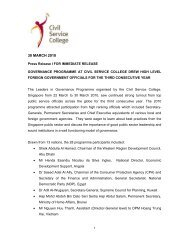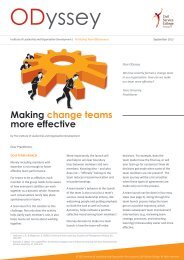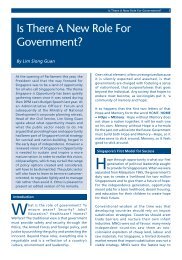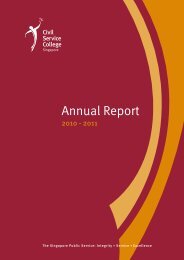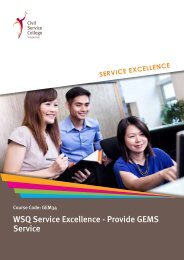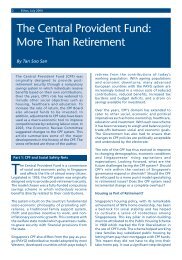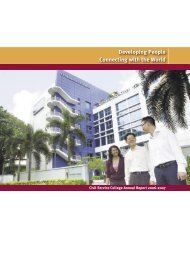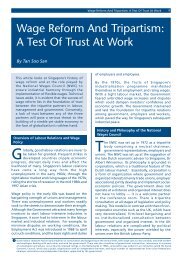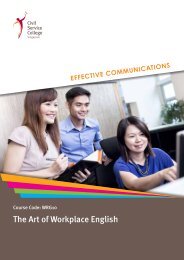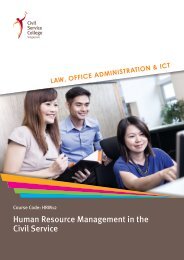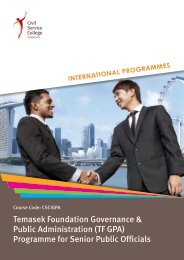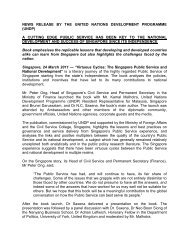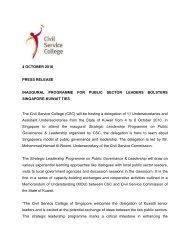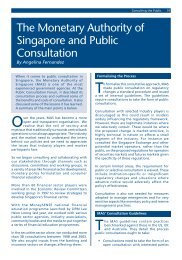Public Consultation Toolkit - Civil Service College
Public Consultation Toolkit - Civil Service College
Public Consultation Toolkit - Civil Service College
Create successful ePaper yourself
Turn your PDF publications into a flip-book with our unique Google optimized e-Paper software.
<strong>Public</strong> <strong>Consultation</strong> <strong>Toolkit</strong> <strong>Public</strong> <strong>Consultation</strong> <strong>Toolkit</strong><br />
2. Reasons for public consultation<br />
The reasons for public consultation in Singapore are:<br />
1. To feel the pulse<br />
• Anticipate concerns from stakeholders/public early<br />
• Understand stakeholder/public sentiment and the ground situation<br />
• Provide a channel for stakeholders to be heard and enable greater participation in the<br />
policy development process<br />
2. To test and refine ideas for better policy solutions<br />
• Gather diverse views and insights from stakeholders/public<br />
• Ascertain feasibility of intended policy change or new initiative<br />
• Seek options and check against policy alternatives<br />
3. To facilitate implementation of policies and initiatives<br />
• Generate awareness and enable stakeholders to understand the<br />
policies/initiatives better<br />
• Obtain buy-in from stakeholders by seeking their contribution to the policies/initiatives<br />
to be implemented<br />
• Mitigate or find resolutions to opposing interests to prevent conflicting views at<br />
implementation stage<br />
• Couch appropriate public communication messages, particularly for controversial or<br />
contentious issues.<br />
3. Key guiding principles for<br />
public consultation<br />
1. Policy-making should be inclusive and take into account views of stakeholders. <strong>Public</strong><br />
officers should see inherent value in stakeholder feedback.<br />
2. <strong>Public</strong> consultation should be a first thought, rather than an afterthought, in the policy<br />
development process.<br />
3. The outcome of consultation should not be pre-determined.<br />
4. <strong>Consultation</strong> should involve a fair representation of all stakeholders who are affected,<br />
interested and/or can contribute to the policy development process.<br />
5. Modes of consultation should be carefully considered and selected to reach the relevant<br />
stakeholders and gather the appropriate types of information.<br />
6. The consultation process should be conducted in a transparent, consistent, structured and<br />
timely manner. Sufficient time should be given to those being consulted to understand and<br />
respond to an issue.<br />
7. <strong>Consultation</strong> materials should provide sufficient background information that is clear and<br />
easily understandable to participants.<br />
8. The scope and parameters of the consultation should be clear to the participants to set the<br />
right expectations. Participants should be provided with a clear understanding of how their<br />
input will be sought and managed.<br />
9. Agencies should be responsive and follow through with stakeholders on how their feedback<br />
was considered and the extent of its impact on the policy in a constructive manner.<br />
10. Agencies should ensure that the consultation process is mutually respectful, nondiscriminatory<br />
and equitable, regardless of gender, race, age, educational levels or religious<br />
beliefs.



